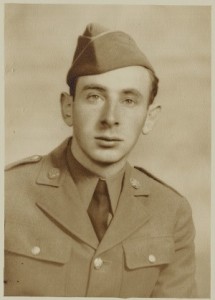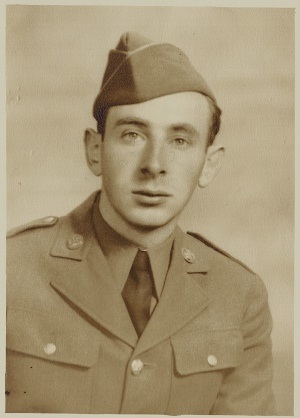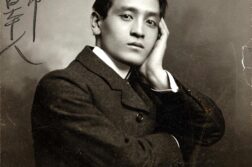RESEARCHER RANDALL SELL has uncovered a previously unknown 149-page manuscript defending homosexuality written in 1940. Allen Bernstein’s “Millions of Queers” is one of the earliest known defenses of homosexuality in English. In it, Bernstein offers a libertarian argument that homosexuals don’t hurt anyone, should not be criminalized and stigmatized, and should be left in peace to work out their non-conforming lives by themselves. Expressing such a view, and signing his name to it as Bernstein did in several essays, was a daring, radical act in its day. Bernstein’s essay is unusual for its use of everyday, largely derogatory terms, especially “homo” and “queer,” as casual, value-neutral labels, anticipating by decades the attempt to reclaim the word “queer” by GLBT rights activists.
Working with historian Jonathan Ned Katz, Sell has also documented the remarkable life of its author, Allen Bernstein, a gay, Jewish World War II

veteran. “Bernstein’s eccentric essay—personal, sociological, and historical—is a major discovery in gay American history,” said Jonathan Ned Katz , co-director of OutHistory.org. “This adds one rare, fascinating account to the small genre of homosexual defenses written or published in the U.S. in the early to mid-20th century.” Bernstein’s entire manuscript is published on OutHistory.com.
Randall Sell, an associate professor at the Drexel University School of Public Health, found the manuscript in 2010 while searching the National Library of Medicine for the earliest uses of the term “queer” in reference to homosexuality. As a public health researcher whose specialty includes measuring and estimating population prevalence of homosexuality, Sell was particularly intrigued by the document’s title, “Millions of Queers.” After studying the manuscript for several years, Sell eventually identified Bernstein as the possible author and reached out to Katz. Together, they confirmed the essay’s authorship and began a collaborative process of scholarly analysis that is still ongoing.
Katz noted that Bernstein’s document is a rich source of historical insight into gay culture from the 1920s and ’30s. It offers glimpses into hundreds of lives based on Bernstein’s direct observation and a network of pseudonymous informants. Included are anecdotes about an active Bohemian queer culture in Boston, stories about gay men’s lives in heterosexual marriages, legal persecution for homosexual behavior, and the deaths of queer friends by suicide.
Analyzing “Millions of Queers”
ALLEN IRVIN BERNSTEIN’S 149-page, typed, unpublished manuscript, dated January-June 1940, resided for decades in the National Library of Medicine in Washington, D.C., unknown and unheralded. Perhaps its eccentric title, suggesting an exercise in cranky homophobia, caused researchers to ignore it, sight unseen. So, until Randall Sell came along, no one noted that “Millions of Queers” is an early, unsung defense of homosexuality. It’s also a rich document of homosexual American history. Even more extraordinary, Sell’s clever detective work revealed that its feisty Jewish author used his own real name on this defense, and lived a complicated, fascinating life.
As a sociological, anthropological, and historical survey, and as a personal polemic, “Millions of Queers” anticipates and most resembles a book published eleven years after it: The Homosexual in America, A Subjective Approach (1951), by the married sociologist Edward Sagarin, using the pseudonym Donald Webster Cory. Like Sagarin, Bernstein accepted many of the negative clichés about homosexuals of his times but asserted that they should not be persecuted under the law. Since homosexuals don’t hurt anyone by their actions, they should not be stigmatized nor their sexual activities criminalized. He argued that the state (lawmakers, police, judges, and jailors), the medical establishment (doctors, psychiatrists, psychologists), the media, parents, and citizens should stop harassing homosexuals.
His defense will disappoint anyone judging it against today’s dominant view of GLBT people as psychologically healthy. He takes seriously many of the damning judgments that cursed homosexuals in 1940. His essay documents an archive of bad feelings, the trauma of being despised and discounted, that he and other homosexuals suffered and had to transcend to survive. It’s painful now to hear him seriously pondering the notion that homosexuals suffer a “puberty fixation” and stagnate at an immature stage of emotional development (as if there are no immature heterosexual adults). It’s disheartening to hear him suggest that homosexuals must inevitably suffer an isolated, lonely, pitiful old age (as if there are no old, isolated, lonely heterosexuals).
Bernstein’s title stresses numbers—the existence of “millions of queers.” His estimate of 2,600,000 American homosexuals is offered as a reason to understand this reviled, criminalized population. He compares the treatment of homosexuals to that of “the Negro … sharecroppers … and the unemployed,” but he never actually presents homosexuals as a “minority” suffering discrimination. That was a new and radical idea when first put forward a decade later, in 1950, by the gay Communist Harry Hay.
Given his acceptance of his society’s anti-homosexual clichés, it is in fact remarkable that, in 1940, Bernstein pounded out on a typewriter this 150-page manifesto protesting the unjust treatment of America’s homosexuals. His research and writing in “Millions” reveals a tough inner core, a strong, obstinate, ornery, dissenting spirit. (Note that throughout “Millions” he consistently misspelled the plural “homoes,” suggesting that he didn’t show his essay around much. No friend told him to correct the non-standard usage that makes him sound ignorant or crackpot, undermining his work’s authority.)
Bernstein emphatically protests the stereotype of all male homosexuals as effeminate “fairies” and all lesbians as masculine “dikes”: “The fairies and the masculine looking dikes are a lunatic fringe or an important subsection, but only a fringe or subsection. Homo America is as dispersed as an ideal public-opinion poll sampling.” He identifies an extensive contemporary vocabulary that could be applied to sexual and gender nonconformists: “We are the third sex; the urners; the lesbians, dikes, tribades; the inverts, perverts; the pansies, fairies, transvestists; the aunties, wolves, fags; the pederasts; the homosexuals.”
He also defiantly uses sexually explicit language. He rejects, for example, the Latin “fellatio” for the Anglo-Saxon “cocksucking.” I interpret this as his in-your-face way of opposing the insistent anti-sex morality that even today makes the slang’s bold evocation of mouth-penis contact unspeakable in “polite society.” In an early usage of a contemporary trope, his essay also mobilizes “love” in a positive way when describing “man-loving men” and “woman-loving women”—terms we thought we had coined in the early 1970s.
At one point he complains: “No … guide book ever lists the gay places (using ‘gay’ in our specialized sense of ‘queer’).” His explanation, in 1940, that “gay” is homosexuals’ alternate word for “queer” is an early, important documentation of that usage. His frequent and casual use of “gay” in this essay suggests that he and others had by then made it their own, a positive alternative to the negative, medical “homosexual.”
Bernstein posits in “Millions” the universal, transhistorical existence of homosexuals. Homos have always been here, he claims, and efforts to eradicate them always fail. He offers their stubborn longevity as a good reason to stop treating them as outcasts, which only worsens their plight. “Millions” is, in part, an early attempt to research and analyze the American history of homosexuals, understood as a group that has stayed essentially the same while society’s responses to it have changed over time.
A major concern of Bernstein’s is what he perceives as the brevity of homosexuals’ intimate relationships. Same-sex intimacies last five years at the most, he thinks, though he admits to exceptions. Most homosexuals, he claims, “are lone wolves; they may live, for a time, in pairs. They separate quickly. Their apings of hetero marriages are dismal caricatures and failures.” In a desolate section on “Old Age; Marriage; Suicide,” he says: “It seems somehow impossible for queers to grow old together. Their friendship may become deeper, transcending the flesh, but they drift apart.”
Bernstein is fascinated by hetero marriage as a way out of what he sees as the isolation of aging male homosexuals. Facing old age, some of them think about marrying, he says, and some actually “try marriage, normal, heterosexual marriage.” As he ponders the efficacy of a male homosexual’s decision to marry a woman, he seems to be anticipating the life he himself would adopt when he got married six years later. He followed his own advice when he warned male homosexuals to alert potential wives to their potential husband’s homosexuality: “if you get married you let her know first.”
“Millions” is, in part, an early anthropological study by a participant observer of the scene on which he’s reporting. He generalizes about homosexuals, he tells us, from “observation of a hundred-odd cases over a period of years, from people known casually for two minutes on a park bench or closely for a period of years.” A network of pseudonymous informants provides him telling quotes about and descriptions of individual lives.
Bernstein’s treatise contains no hint that homosexuals could ever cause a national ruckus by becoming a political movement. So it’s pleasing to know that before Bernstein died in 2008 he participated, starting in the 1980s, in several gay political, service, and social organizations. In light of his 1940 image of gay male elders as leading dismal, isolated lives, it’s good to know that in his own old age he was busily, actively, and happily engaged in his local community.
Jonathan Ned Katz
Who Was Allen Bernstein?
BORN IN NASHUA, New Hampshire, in 1913, Allen Irvin Bernstein grew up with his Jewish parents and brother in Salem, Massachusetts. His writing on homosexuality was most likely influenced by people he met face-to-face early in life, or by works he read. Evidence does not yet show conclusively who or what those influences were, but there are several possibilities.
While in his teens or early twenties, Bernstein was writing poetry about cruising for men in Boston Common, adjacent to Beacon Hill, which is bisected by Joy Street. In “Millions of Queers” he reports: “Boston’s fake Bohemia of the latter 1920’s, the Joy Street gang, was definitely queer.” In 1929 he would have been sixteen years old and could have first made personal acquaintance with this “gang” while attending Tufts University, just outside of Boston, for a year (1929–30). That “gang” almost certainly included Prescott Townsend, who resided at 36 Joy Street from the early 1920s through the early 1940s. Arrested in 1943 for committing an “unnatural and lascivious act” and imprisoned, Townsend later emerged as a pioneering organizer of a Boston chapter of the Mattachine Society and the Boston Demophile Society.
After attending Tufts, where he took introductory French, Bernstein finished his undergraduate education as a history major at Union College (1930–33), where he was a member of the French Club. In “Millions of Queers” he often references André Gide’s defense of homosexuality in Corydon, which wasn’t published in English until 1950. In Bernstein’s 1938 essay, “They Didn’t Mean Us,” he says: “Corydon, a homoe’s defense, was for a time my bible.” Bernstein may have first came across Corydon at Tufts or Union College, or it may have been at the University of Chicago, where he received a master’s degree in history in 1934.
Bernstein was writing and trying to publish essays and poetry on homosexuality beginning as early as 1938, but even the most radical publications of the time probably found his writings too provocative, and none are known to have been published. His essays titled “A Pervert Talks Back” and “They Didn’t Mean Us,” both dated 1938, defend a man on death row for the sexual assault and murder of a young boy, while at the same time strongly condemning pedophilia, with which homosexuality was often equated.
He received a rejection from the North American Book of Verse for a poem titled “Evening Urban Hikers,” about cruising men in Boston Common. He included this poem in “Millions of Queers” and in his self-published book Poems Partly Pederastic in 1941. (He used “pederastic” and “pederasty” as a synonym for “homosexual,” as did others at the time.) He also copyrighted this provocatively titled book of poems, sending it to the U.S. Copyright Office and giving his address as “Fort Wadsworth, NY,” where he was stationed as a U.S. Army soldier! In addition, he sent copies of his Pederastic volume to a dozen major libraries in the U.S. and England.
He received a second rejection for a 1944 open letter discussing his discharge from the army for being homosexual. The rejection came from the editor of Common Sense, a left-of-center political magazine published between 1932 and 1946. An editorial assistant noted in a letter to Bernstein that Common Sense did not publish open letters, but that if Allen would “cut this down considerably, it might be possible, however, to use it in our Soldier’s Forum.” The manuscript of Bernstein’s essay, “My Blue Section 8 Discharge,” has “Common Sense” written on the top in pencil, probably indicating his attempt to resubmit it.
Just as Bernstein used several names to introduce himself, he also used many different terms in his writings to describe homosexuals, including homos, lesbians, dikes, tribades, queers, perverts, gays, fairies, queens, third sex, inverts, pansies, transvestists, cross-dressers, aunties, wolves, fags, pederasts, and degenerates. He seems to have been an early adopter of a reverse discourse that reclaimed terms with pejorative connotations in an effort to neutralize their sting.
Bernstein voluntarily enlisted in the army on September 19, 1940, first serving as an ordinary soldier and then as a staff sergeant in the Quartermaster Corps for eighteen months. He was not asked about his sexual orientation at the time of his enlistment, but he believed there was a form on which a doctor indicated, without asking, that he was not homosexual. Bernstein was able to select where he wanted to be posted. He chose Staten Island so that, on weekends, he could take the nickel ferry to Manhattan and meet casual pickups. He was then transferred to Fort Lee, Virginia, two hours from Richmond, where he would meet other gay men. He and one regular pickup, another service member, would meet in Richmond and sleep together in the house of a woman who did not apparently perceive them as homosexual.
On January 22, 1944, Bernstein went with another service member to the Richmond Theater to see the visiting Russian Ballet. After Bernstein verbally expressed a sexual interest in this man, the man took the bus back to the base, leaving Bernstein alone in Richmond. As Bernstein recalled in his Library of Congress interview, he “looked around, saw a sleeping sailor—there was a guy sleeping at the USO—and said ‘Do you want to share a room?’ He said ‘Sure.’ So, I got into bed, I said something, ‘Well, you’re attractive.’ He got dressed and left. And I fell asleep. Two hours later, the door, bang on the door, ‘These are the MPs!’ He had filed a statement … an affidavit. I said ‘Sure, I’m gay’ and the roof fell in.”
After one hour’s notice, he was brought before a board that transferred him to a psychiatric ward. There he remained while the paperwork for his discharge was processed. After three weeks on that ward, he was given his blue Section 8 discharge and civilian clothes, and was driven to the Fort Lee gate. He was told he was a citizen, given ten dollars, and left to his own devices. He recalls that he “was left without pride, without self-esteem, and in disgrace.”
Bernstein’s first letter appealing his less-than-honorable discharge is dated March 4, 1944, eight days after being dropped outside the Fort Lee gate. He continued to appeal his discharge numerous times until, 37 years later, on July 16, 1981, he succeeded in persuading the Army to convert it, retroactively, to an honorable discharge. When he began his appeals, he stated in his open letter to Common Sense that only twice since the founding of the U.S. military had anyone, for any reason, successfully appealed a dishonorable discharge. He made his first appeal knowing the odds were heavily stacked against him.
In May, 1981, Bernstein wrote a short document titled “Credo at 67.9.” Here he summed up beliefs that explain why he so persistently attempted to advance gay rights through writings and participation in political organizations:
I believe in the unlimited, miraculous capacity of mankind to advance and change things for the better through the power of reason. Nothing happens simply; there are always multiple causes and effects. Unfortunately, there are always bastards and vandals in the world, and thorns in the roses. It is my religious duty to keep hitting my head against stone walls to push them down, to keep fighting city hall. There is no inevitability about the forces-of-good or the forces-of-evil winning. Individualists will always find the rest of the world is “out of step” with them.
Bernstein spent much of his adult life living quietly in Maine, rarely calling attention to his pioneering protests against anti-homosexual bigotry. Like many gay men and lesbians, he seems to have compartmentalized his life, keeping much of it hidden from those who knew him. The epitaph Bernstein’s sons chose to place on his tombstone in recognition of his struggles and ultimate vindication comes from the Bible and reads: “Thou hast striven with God and with men, and hast prevailed.”
Jonathan Ned Katz, author of the groundbreaking Gay American History: Lesbians and Gay Men in the U.S.A. (1992) is a founder and co-director of OutHistory.org.
Randall L. Sell is an associate professor at Drexel University. Anyone with information on Allen Bernstein is urged to contact the author at sellran@gmail.com.






